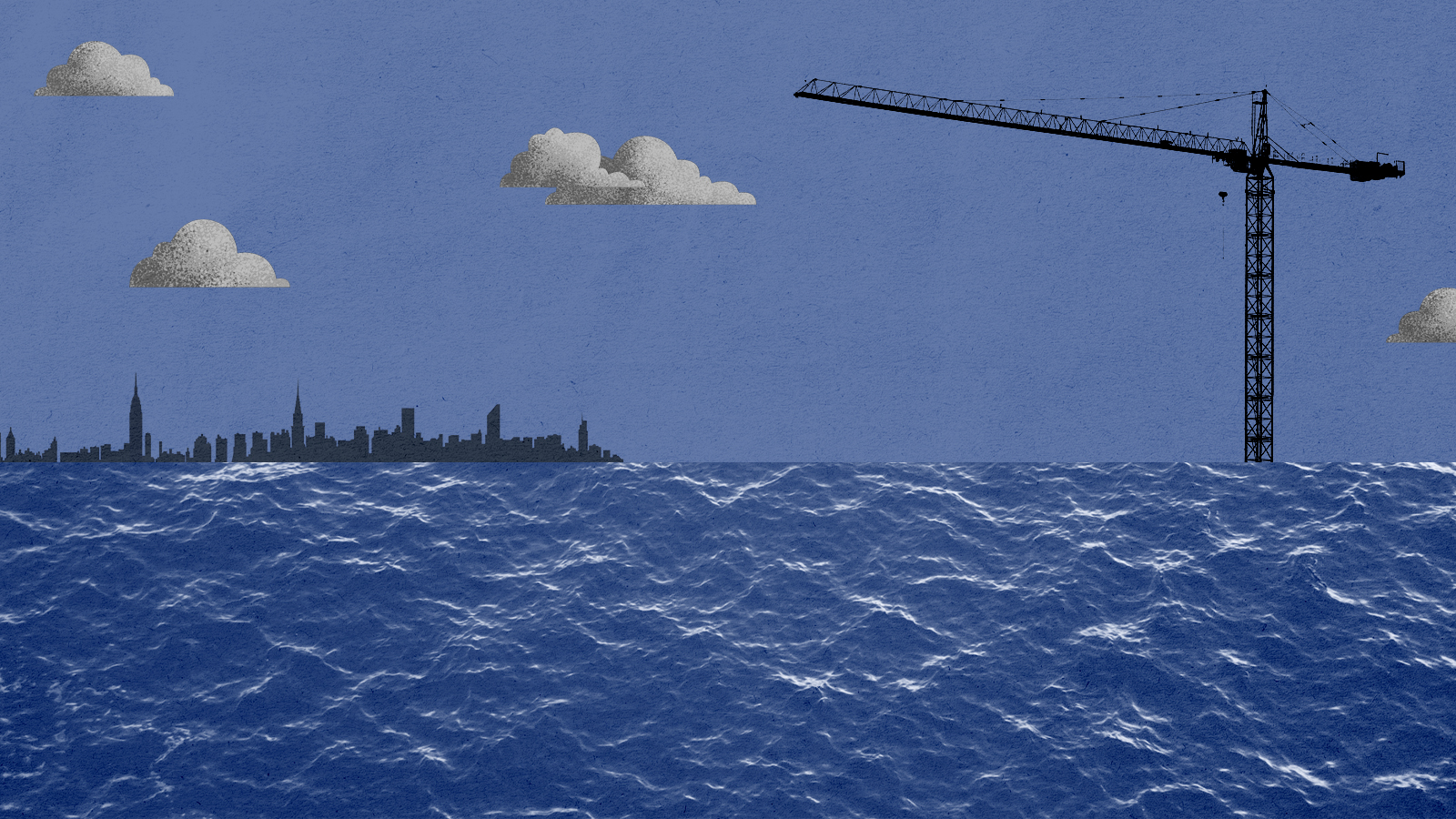Preparing for our climate future requires building better now
We can't keep building back better from climate crises. We need to build right the first time.


A free daily email with the biggest news stories of the day – and the best features from TheWeek.com
You are now subscribed
Your newsletter sign-up was successful
The National Oceanographic and Atmospheric Administration released a new report this week predicting a sea level rise of roughly one foot within the next 30 years. The consequences for coastal communities could be quite severe: Damaging floods would be 10 times as common as they are today, and would reach much further inland. The rising waters won't stop there. Just based on emissions to date, the report predicts sea levels rising at least another foot by the century's end; if emissions aren't curbed, that number could be as much as five feet higher.
Decarbonizing is essential to preventing the latter scenario. But even a rise of a foot or two more would put major coastal cities in danger. Over the next couple of decades, therefore, we're going to need to invest huge sums of money simply to preserve what we have. The bipartisan infrastructure bill that passed last year was only a small downpayment on what is going to be required.
There's an alternative way to think about it, though, a complement to the foregoing, not a contradiction. Climate change is going to accelerate the depreciation of a host of very large and expensive assets. It's going to cost more and more money to keep those assets viable — to protect coastal cities from storm surges, to protect arid areas from water shortages, and so forth. In some cases, no amount of money will suffice: If snowmelt dries up, power from a hydroelectric plant run by that meltwater will dry up too.
The Week
Escape your echo chamber. Get the facts behind the news, plus analysis from multiple perspectives.

Sign up for The Week's Free Newsletters
From our morning news briefing to a weekly Good News Newsletter, get the best of The Week delivered directly to your inbox.
From our morning news briefing to a weekly Good News Newsletter, get the best of The Week delivered directly to your inbox.
As markets start to factor that reality into their valuations of those assets, we should expect to see a shift, in some cases, from building back better to abandoning and moving on — not only from particular dams and roads but from entire cities and regions.
How will our political system adapt in turn? It's hard to know for sure, but the safe way to bet is that our government will be more reactive than proactive. That is to say, it will be more responsive to powerful local constituencies that demand relief and protection from climate-related disasters than it will to calls for a more thoroughgoing restructuring, even if the latter would be more valuable in the long run. Politicians representing Tampa, Houston, or New York City will naturally lobby for funds to defend those cities, and will likely be more successful than not. It would be against their parochial interest, after all, to make it easier for their constituents to move to Minneapolis.
It's important, for that reason, that we recognize the risks of that parochialism. We absolutely need to invest in protecting our existing infrastructure and communities. But we also need to facilitate the construction of new infrastructure and communities in places that will naturally be much more resilient. Indeed, that kind of investment could prove even more valuable down the line.
From an international perspective, countries with more opportunity and ability to build right the first time are going to have a significant competitive advantage over countries with a lot of vulnerable assets to protect. This is a phenomenon already familiar from technological transitions. Countries that never built wireline phone systems, for example, were able to leapfrog directly to cellular phones and achieve widespread connectivity at a much lower cost. Countries today with large and growing power needs have the opportunity to meet them with green energy technologies that are much cheaper than they were only a decade ago, and thereby avoid some of the transition costs of decarbonization.
A free daily email with the biggest news stories of the day – and the best features from TheWeek.com
The same is likely true for climate adaptation. China has engaged in a historically unprecedented building boom over the past generation, constructing entire new cities along with massive transportation and power-generation projects. To the extent that they ignored the prospect of climate change in their plans, that was an enormous missed opportunity that, had they made the opposite choice, could have contributed massively to their future economic competitiveness. Countries like India and Nigeria, which will face enormous infrastructure needs in the future even without climate change due to the combination of demographic expansion, economic growth, and rapid urbanization should not make the same mistakes.
Small countries face opportunities as well, and not just risks. The small Caribbean island of Dominica has been a recent leader in climate adaptation, recognizing that they risk repeated destruction from hurricanes like Maria, which caused damage equivalent to over twice their annual GDP. Rebuilding successfully in a way that makes the island more resilient will not only make it a more attractive investment destination compared to its peers. In the best case, it could give it expertise that could become a services export industry.
Wealthy countries with a great deal of land and an openness to immigration, like Canada, are in the best position of all to build out new infrastructure in locations likely to be most resilient to climate disruption, and thereby to grow economically and demographically even as they also spend what is necessary to make existing communities more resilient. The long-term relative trajectory of world power could be meaningfully shaped by which countries have those opportunities and choose to seize them, and which do not.
The struggle to decarbonize the world economy is an absolutely vital one. But the struggle to adjust to change that is already certain to accelerate is equally vital. Trillions are going to be spent on adapting to the reality of a warmer world. If we want to remain competitive, we need to make sure we get the biggest bang for the climate adaptation buck.
Noah Millman is a screenwriter and filmmaker, a political columnist and a critic. From 2012 through 2017 he was a senior editor and featured blogger at The American Conservative. His work has also appeared in The New York Times Book Review, Politico, USA Today, The New Republic, The Weekly Standard, Foreign Policy, Modern Age, First Things, and the Jewish Review of Books, among other publications. Noah lives in Brooklyn with his wife and son.
-
 Film reviews: ‘Send Help’ and ‘Private Life’
Film reviews: ‘Send Help’ and ‘Private Life’Feature An office doormat is stranded alone with her awful boss and a frazzled therapist turns amateur murder investigator
-
 Movies to watch in February
Movies to watch in Februarythe week recommends Time travelers, multiverse hoppers and an Iraqi parable highlight this month’s offerings during the depths of winter
-
 ICE’s facial scanning is the tip of the surveillance iceberg
ICE’s facial scanning is the tip of the surveillance icebergIN THE SPOTLIGHT Federal troops are increasingly turning to high-tech tracking tools that push the boundaries of personal privacy
-
 How climate change is affecting Christmas
How climate change is affecting ChristmasThe Explainer There may be a slim chance of future white Christmases
-
 Why scientists are attempting nuclear fusion
Why scientists are attempting nuclear fusionThe Explainer Harnessing the reaction that powers the stars could offer a potentially unlimited source of carbon-free energy, and the race is hotting up
-
 Canyons under the Antarctic have deep impacts
Canyons under the Antarctic have deep impactsUnder the radar Submarine canyons could be affecting the climate more than previously thought
-
 NASA is moving away from tracking climate change
NASA is moving away from tracking climate changeThe Explainer Climate missions could be going dark
-
 What would happen to Earth if humans went extinct?
What would happen to Earth if humans went extinct?The Explainer Human extinction could potentially give rise to new species and climates
-
 Bacteria can turn plastic waste into a painkiller
Bacteria can turn plastic waste into a painkillerUnder the radar The process could be a solution to plastic pollution
-
 Florida has a sinking condo problem
Florida has a sinking condo problemUNDER THE RADAR Scientists are (cautiously) ringing the alarms over dozens of the Sunshine State's high-end high-rises
-
 Diamonds could be a brilliant climate solution
Diamonds could be a brilliant climate solutionUnder the radar A girl and the climate's best friend
